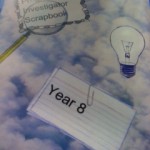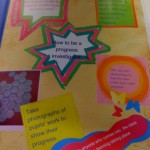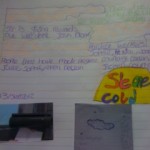 Today we had a training session delivered from a former HMI on the new inspection framework. It was actually quite interesting. She delivered the key messages in a clear (and perhaps a little eccentric!) manner. We were looking at lesson observations in particular, although the session covered other things. I went into the training a bit apprehensive and with this question in mind: If Ofsted are focussing on progress over time, then what is the point of a lesson observation?
Today we had a training session delivered from a former HMI on the new inspection framework. It was actually quite interesting. She delivered the key messages in a clear (and perhaps a little eccentric!) manner. We were looking at lesson observations in particular, although the session covered other things. I went into the training a bit apprehensive and with this question in mind: If Ofsted are focussing on progress over time, then what is the point of a lesson observation?
Now, I am not driven by Ofsted. They play such a small part in my day to day life that I am clear that I will focus on what is best for students and the idea is that Ofsted come in and see that and say well done. However, I am not naive. I know that the judgement Ofsted place on my school will have a profound impact and I want to make sure that I am up to date on their thinking. We have outstanding teachers and great students- I don’t want that to get ignored because we miss out something straightforward that Ofsted want to see.
I have to say that I find very little that I strongly disagree with in their inspection standards. I do have an issue with the idea that one lesson observation can define my teaching. What is pleasing to know is that Ofsted seem to agree. While I acknowledge that individual inspectors may have their own subjective idea on what is an outstanding lesson, here are my conclusions based on today’s session:
It’s all about progress over time
I have a problem with teachers who phone it in for the year and then pull out the same outstanding lesson they’ve taught time and time again. Inspectors, quite rightly, should dig deeper and find evidence of that sustained progress over time. In addition to the data and markbooks, they find the evidence in the following places:
Pupils’ books: These will show that students work hard and are given feedback that makes a difference. They won’t be dog-eared, empty and unmarked.
The classroom environment: While she was clear to state that this wouldn’t be a limiting factor, our HMI did say that it made it a heck of a lot easier for her if the classroom environment screamed learning.
The students: “I get what I need from students when I visit a school.” Maybe this does lend itself to students being pre-programmed with what to say but I don’t think this needs to be the case. My pupils can say what they need to do to improve- usually in unelegant language but they know it because we work hard on it for the right reasons.
How as well as what
Ofsted are looking for progress in that short space of time but they also like to see the process. How do students learn it then and over time? This is where routines and classroom systems come into play. She mentioned ‘talk partners’ and ‘next steps books’ in a year 2 lesson she had seen. When it is evident that students are used to working in a certain way then they not only demonstrate learning there and then but it is clear that this goes on over time. Once again, it is going against the idea of blagging a lesson.
No ‘prescribed methodology’
The HMI described an observation which had no learning objective written on the board. It was outstanding. (Here is a great presentation on different approaches to learning objectives.) There was not a tick box process. I think schools need to have a shared language of how we construct lessons and I feel that the 3/ 4+ part lesson is a not unhelpful method but I like flexibility and it is good to know that a lesson is judged on its own merits. I think there are a range of strategies that work and there are a number of ways of putting these strategies together.
Ofsted are keen to stress that Grade descriptors for the Quality of teaching are ‘not designed to be used to judge individual lessons.’ They acknowledge too that ‘not all aspects of learning, for example pupils’ engagement, interest, concentration, determination, resilience and independence, will be seen in a single observation.’
I don’t know if it was just limited to our HMI, but I got a real sense that outstanding lessons have a feel to them that is not always easily explained. It’s quite hard to put that in an action plan mind you!
I am actually quite positive that the work that we do over a long period of time will be acknowledged by inspectors. We work hard and do a good job but I certainly have some bad lessons that don’t go as planned- this is just as likely to happen during Ofsted. What makes me look upon Ofsted with less apprehension is if they talk to the kids, look at the grades and look at my books they will see the truth.*
*Except my year 9 books. Please don’t look at my year 9 books.


